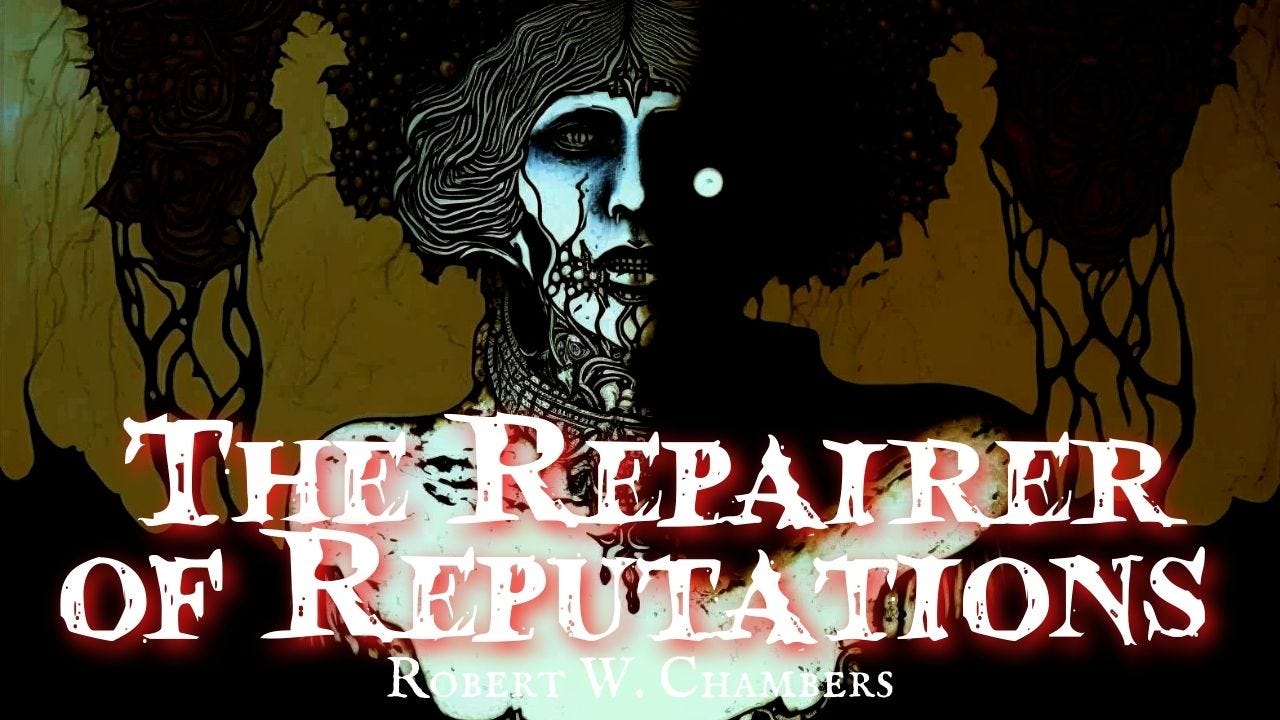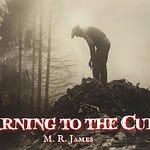Robert W. Chambers
Robert W. Chambers was an American author and artist born on May 26, 1865, in Brooklyn, New York. He is most famous for his collection of short stories, "The King in Yellow," published in 1895, which influenced many writers of horror and weird fiction.
Chambers was born into a family of artists and attended the Art Students League of New York. H e initially pursued a career as a fine artist, working as a sketch artist for magazines and newspapers. He also illustrated books, including editions of Edgar Allan Poe's works.
Chambers began writing fiction in the 1890s and published his first collection of short stories, "In the Quarter," in 1894. However, it was his second collection, "The King in Yellow," that gained him recognition as a writer. The stories in this collection were inspired by the eponymous play featured in the book, which is said to drive anyone who reads it to madness.
Chambers kept writing throughout his life and published many novels and collections of short stories, such as "The Maker of Moons" (1896), "The Mystery of Choice" (1897), and "The Tracer of Lost Persons" (1906).
In addition to his writing, Chambers was also an avid traveler and outdoorsman. He spent much of his time traveling and hunting in rural America and Europe, which provided inspiration for many of his stories.
Chambers died on December 16, 1933, in New York City, at the age of 68. Although he is often overlooked today, his work has had a significant impact on the horror and weird fiction genres and has continued to inspire writers to this day.
Carcosa
Ambrose Bierce's short story "An Inhabitant of Carcosa" takes place in the made-up city of Carcosa (1886). After its destruction, the old and mystical city is seen only in retrospect by a figure who previously lived there.
Robert W. Chambers is credited with popularising the use of the name "Carcosa" in fiction. Other authors have followed in Chambers' footsteps.
Carcosa is a fictional city that appears in Robert W. Chambers' collection of short stories, "The King in Yellow," published in 1895. The city is said to be located somewhere in the distant past or future, and is associated with supernatural and otherworldly phenomena.
In the stories, Carcosa is often described as a mysterious, ancient city with strange and eldritch architecture, inhabited by otherworldly beings and surrounded by a mysterious and ominous atmosphere. The city is also associated with the eponymous play, "The King in Yellow," which is said to originate from Carcosa and is said to drive anyone who reads it to madness.
Over time, Carcosa has become a popular element of the wider Cthulhu Mythos, a shared universe of horror and weird fiction created by H.P. Lovecraft and other writers. The city has appeared in numerous works of fiction, films, and games, and has become an iconic symbol of cosmic horror and the unknown.
The King in Yellow
"The King in Yellow" is a collection of short stories by Robert W. Chambers, first published in 1895. The book is named after a fictional play that features in several of the stories, which is said to have the power to drive anyone who reads it to madness.
The stories in "The King in Yellow" are primarily set in an imagined world that is similar to our own, but with supernatural and otherworldly elements. The stories explore themes of madness, despair, and the unknown, often blurring the lines between reality and fiction.
The eponymous play, "The King in Yellow," is said to be a forbidden work of art, which only a few have ever read. Those who do read it are said to be haunted by its contents and driven to insanity. The play and its titular character, the King in Yellow, have become iconic symbols of cosmic horror and the unknown.
"The King in Yellow" has had a significant impact on the horror and weird fiction genres and has influenced many writers, including H.P. Lovecraft, who incorporated elements of the book into his own works. The book remains popular today and is considered a classic of horror and weird fiction.
Eugenics
Eugenics is a term used to describe a social movement that gained popularity in the late 19th and early 20th centuries. It refers to the study of or belief in the possibility of improving the genetic quality of the human population through selective breeding or other forms of intervention.
Eugenicists believe that by promoting the reproduction of individuals with desirable traits and discouraging the reproduction of those with undesirable traits, they can improve the genetic makeup of the human race. This led to the implementation of policies such as forced sterilization, immigration restrictions, and marriage laws, which aimed to prevent certain groups of people from reproducing.
However, eugenics has been widely criticized and condemned for its association with racism, discrimination, and human rights violations. The movement was used as a justification for forced sterilization programs in several countries, including the United States, where it was implemented on a large scale in the early 20th century. The eugenics movement was also exploited by the Nazis in Germany during the 1930s and 1940s, leading to the horrific genocide of millions of people deemed to be "undesirable" based on eugenic principles.
Today, eugenics is considered to be a discredited and morally abhorrent concept. The scientific consensus is that genetic diversity is a key factor in the survival and adaptation of the human species, and that attempts to control or manipulate human reproduction for eugenic purposes are unethical and potentially dangerous.
The Repairer of Reputations
"The Repairer of Reputations" is a short story by Robert W. Chambers, first published in 1895. It is part of the collection of stories titled "The King in Yellow."
The story is set in a dystopian version of New York City in the future, where the government has implemented a social order based on eugenic principles. The main character, Hildred Castaigne, is a young man who believes himself to be the heir to a vast fortune, but is also suffering from mental illness.
The story explores themes of power, madness, and the manipulation of reality. Castaigne becomes increasingly obsessed with a book called "The King in Yellow," which he believes holds the key to his inheritance. He also becomes convinced that he is the rightful ruler of a utopian society, which he plans to create through violent means.
The Repairer of Reputations is a mysterious character in the story who offers a service to repair people's reputations, by erasing negative memories and replacing them with positive ones. However, it is later revealed that the Repairer is not a real person, but a delusion created by Castaigne's damaged mind.
The story can be interpreted as a critique of eugenic principles and the dangers of social engineering. It also highlights the fragility of the human mind and the potential for individuals to create their own realities, regardless of their objective validity.
Hildred Castaigne, the narrator of Robert W. Chambers' "The Repairer of Reputations," is an unreliable narrator, a common literary device used by authors to create tension and ambiguity in their stories. Castaigne's unreliability is evident from the outset, as he claims to have suffered brain damage and to have read the cursed play, The King in Yellow, which has led him to believe in a fantasy world that is not real.
Castaigne's unreliability is further reinforced by his belief that he is the rightful heir to a vast fortune and that he is destined to create a utopian society through violent means. These delusions, along with his belief in the fantasy world of The King in Yellow, suggest that he is suffering from a serious mental illness.
Despite these red flags, Castaigne maintains his credibility as a narrator through his attention to detail and his ability to vividly describe the world around him. He describes the details of his environment, including the social order and political structure of the dystopian society in which he lives.
However, as the story progresses, it becomes clear that Castaigne's perception of reality is severely distorted, and that his account of events is unreliable. He creates a false identity for himself as the rightful ruler of a utopian society, and his belief in the fantasy world of The King in Yellow leads him to commit violent acts.
In conclusion, Hildred Castaigne's unreliability as a narrator adds depth and complexity to the story of "The Repairer of Reputations." His delusions and mental illness create a sense of unease and tension in the reader, as we are left questioning the validity of his account of events. Ultimately, Castaigne's unreliability serves as a warning about the dangers of unchecked power and the fragility of the human mind.
True Detective
"True Detective" is a television series that premiered in 2014 on HBO. The first season of the show centers around two detectives, Rust Cohle and Martin Hart, as they investigate a series of murders in Louisiana. The show has been noted for its use of literary references, including references to Robert W. Chambers' "The King in Yellow."
"The King in Yellow" is a collection of short stories by Chambers, first published in 1895. The book is named after a fictional play that features in several of the stories, which is said to have the power to drive anyone who reads it to madness.
In "True Detective," the character of Rust Cohle is shown to have a copy of "The King in Yellow" in his possession, which he claims to have found at a crime scene. The book becomes a recurring motif throughout the series, and is used to symbolize the idea of madness and the breakdown of reality.
The show also incorporates other elements of Chambers' stories, including the concept of a cyclical time loop and the idea of a hidden, supernatural world lurking beneath the surface of reality.















The Repairer of Reputations